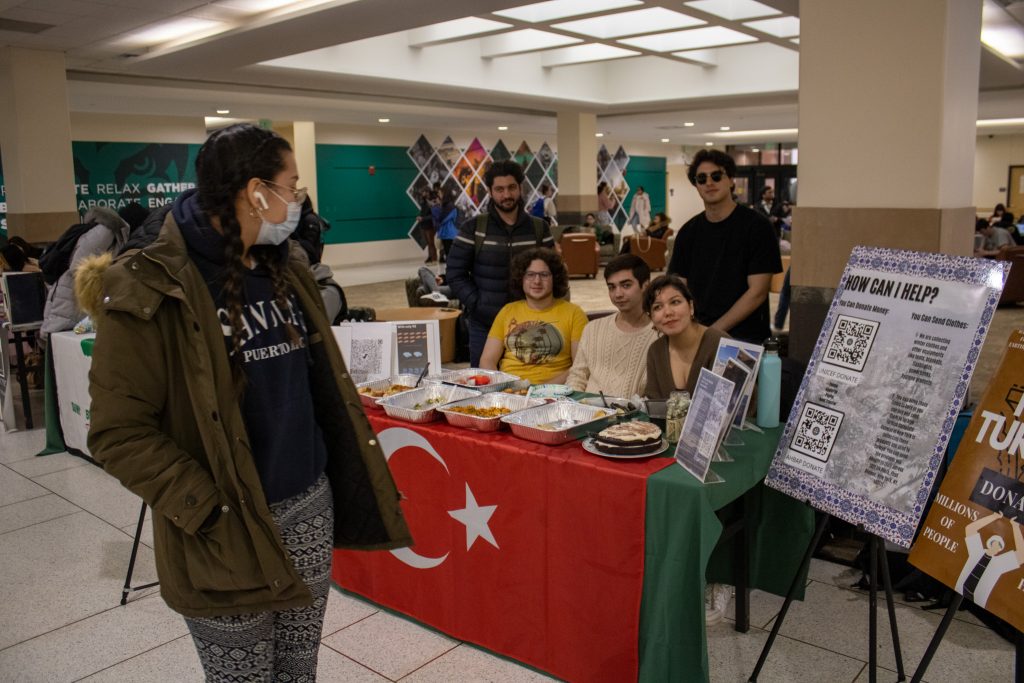Turkish students at Binghamton University have organized a fundraiser for those affected by the recent earthquake in Turkey and Syria.
On Feb. 6, two earthquakes of magnitudes 7.8 and 7.5 hit the border between Turkey and northern Syria, resulting in a death toll of more than 41,000 people, according to independent news source Al Jazeera. Turkish graduate students and the Turkish Culture Association (TURCA) at BU have since worked together to lead the relief effort in Binghamton by collecting donations for Turkish Philanthropy Funds (TPF). TURCA held an event on Monday, Feb. 13, during which they packed supplies donated by the Binghamton community into boxes to be sent to those displaced by the earthquake.
According to Reuters, nearly 25,000 buildings collapsed or were badly damaged due to improper construction, trapping many civilians under rubble and forcing others to endure freezing temperatures without shelter. The search effort for survivors is still ongoing more than a week after the earthquakes, according to the Associated Press.
Mert Can Bayar, a sixth-year graduate student pursuing a Ph.D. in political science — one of the students who began the relief initiative — explained how they chose to raise money for TBF through GoFundMe and tabling donations.
“We started the item donation campaign and searched for organizations to raise funds for and did a lot of research on the credibility of the existing organizations based in the [United States],” Bayar wrote in an email. “After our efforts of research and discussion, we decided to raise funds for the Turkish Philanthropy Funds (TBF), a 501(c)(3) tax-exempt organization. TBF is currently raising funds for its ‘Türkiye Earthquake Relief Fund’ to support local agencies and organizations that deliver food, water, shelter, medicine and other urgent needs to the region affected by this disaster.”
So far, the group has raised over $1,500 in four days, according to Emre Demir, a sophomore majoring in computer science. Demir said the campaign will continue until its goal of $10,000 is reached.
Our colleagues, professors, students and University executives have been extremely supportive and started donating and circulating our fundraising and relief efforts to their departments, colleagues and friends,” Demir wrote. “Local news agencies have interviewed our team about our efforts and agreed to advertise our campaign. We are grateful for every donation. It is great to see that our community here has our back in this difficult time.”
Turkish food — including borek, baklava and bulgur — was served prior to the packing of supplies by the volunteers.
During the relief event, Oktay Sekercisoy, senior director of global partnerships and adjunct professor of international business at BU’s School of Management, gave a speech describing how BU students and the Binghamton community at large contributed to the donations. Those gathered also observed a moment of silence for the lives lost due to the earthquake.
“Since 1978, around 2,000 Turkish students have graduated from [BU],” Sekercisoy said. “Not just students and faculty, but the Binghamton community has come together to provide supplies that will be packaged into boxes tonight.”
Items donated included essentials such as diapers, hygiene products, canned goods and medical supplies. Blankets, hand warmers and jackets were also donated to help survivors who lost their homes face the freezing weather as they stay in emergency shelters. According to Sekercisoy, the supplies will be packed into boxes and driven to New Jersey, where they will then be shipped to Turkey.
Items will be collected until Feb. 26, and any item donations can be dropped off at the Dual Diploma Program (DDP) Office in Academic A, Room 136. TURCA will also be tabling for donations in the University Union lobby from noon to 4 p.m. until Thursday, Feb. 16.
Bayar emphasized the impact the earthquake has had on the region and the “crucial” items these donations will provide for survivors, with millions already facing displacement.
“We are trying to expand our campaign to as many people as possible on campus and in the greater Binghamton area,” Bayar wrote. “A $5-$10 donation can buy food and basic items that are crucial, and a $20-50 donation can buy urgent winter items such as coats, boots and blankets. $100–200 donation can help us raise money quicker for more expensive items such as disaster tents, generators and portable toilets.”



